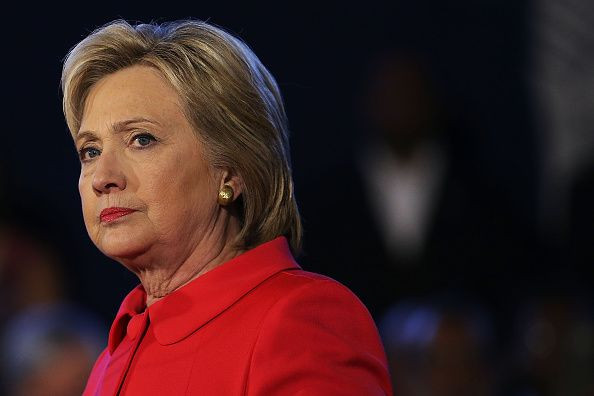Hillary Clinton, In Paid Speeches To Wall Street, Promoted Commission That Pushed Social Security Cuts

During the Democratic presidential primary, Hillary Clinton was criticized for refusing to release the transcripts of paid speeches she gave after she ended her term as Secretary of State. Now, just a month before the election, a transparency group has published what it says are excerpts of those speeches -- and the remarks show Clinton appearing to reassure Wall Street with rhetoric that differed from the kind she voiced in more public forums.
The email was released by the website Wikileaks, as part of what it says are more than 2,600 emails hacked from Clinton campaign chairman John Podetsa. The Clinton campaign has neither confirmed nor denied the authenticty of the emails.
In the email published by Wikileaks, Clinton tells a real estate industry trade association that she believes that as a public official, “You need both a public and a private position” on major issues.
Clinton promised on the campaign trail that she would oppose the 12-nation Trans Pacific Partnership, and that she “will stop any trade deal that kills jobs or holds down wages.” But in the email released by Wikileaks, she is shown telling a Brazilian bank that, “My dream is a hemispheric common market, with open trade and open borders.” She also is quoted saying: “We have to resist protectionism, other kinds of barriers to market access and to trade and I would like to see this get much more attention and be not just a policy for a year under president X or president Y but a consistent one.”
Clinton on the campaign trail declared, “I won’t cut Social Security.” Yet in the email’s excerpts of her Morgan Stanley speech, she lauded a presidential commission that proposed changes that would slash Social Security benefits, according to experts.
The email shows Clinton specifically telling Morgan Stanley that the Simpson-Bowles commission “put forth the right framework” for dealing with fiscal challenges. She also said “the Simpson-Bowles framework and the big elements of it were right.”
As the nonpartisan Center on Budget and Policy Priorities reported in 2011, that commission proposed a plan to “cut benefits for the vast majority of Social Security recipients, weaken the link between a recipient’s benefits and past earnings (which could undermine public support for the program), and, despite the claims of the co-chairs, fail to protect most low-income workers from benefit cuts.”
Clinton was criticized during the Democratic primary for her ties to Wall Street -- and she depicted herself as someone who had been tough on the financial industry. But in other speech excerpts from the email, Clinton appeared to laud the financial industry, and tout her work helping enrich it.
The email shows that in a speech to a securities law firm, she said “I represented and worked with so many talented principled people who made their living in finance.” The email shows her also saying that while she supports some efforts to raise taxes on the financial executives, “I represented them and did all I could to make sure they continued to prosper.” (In a previous interview, Clinton said of the financial industry bailout: “I think the banks of New York and our other financial institutions are probably the biggest winners in this, which is one of the reasons why in the end, despite my serious questions about it, I supported it.”)
Another excerpt in the email shows Clinton suggesting that Wall Street executives are best positioned to write government rules that regulate Wall Street.
“There's nothing magic about regulations, too much is bad, too little is bad,” she told a Goldman Sachs symposium. “How do you get to the golden key, how do we figure out what works? And the people that know the industry better than anybody are the people who work in the industry.”
© Copyright IBTimes 2024. All rights reserved.






















